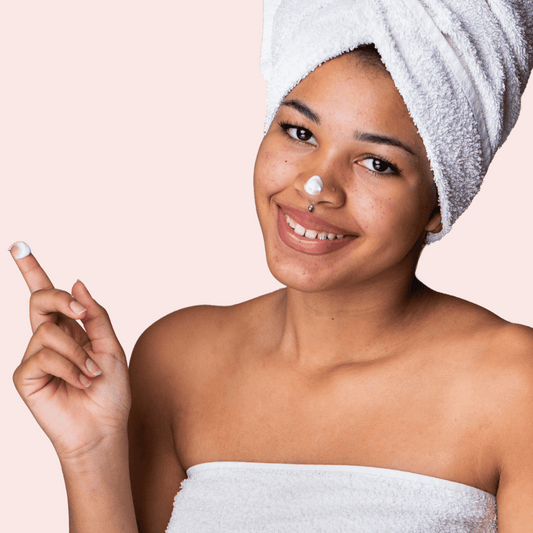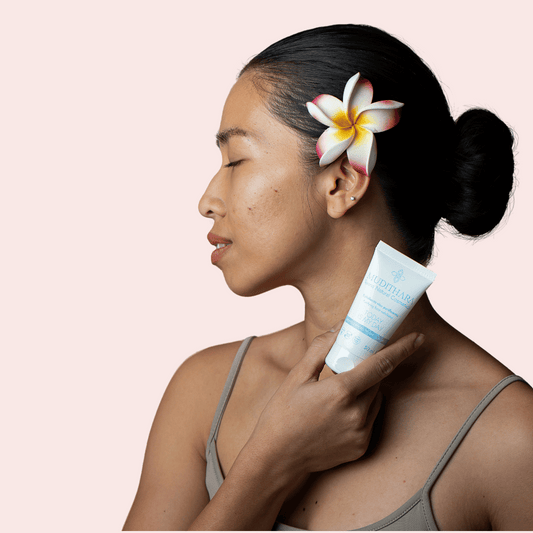SUN AND PIMPLES: TRUTH & MYTHS TO DEBUNK
In the summer, many people with acne-prone skin hope that the sun can “dry out” pimples and improve the appearance of their skin. But is this really the case? The answer, unfortunately, is not what many expect. Let's see together what the real effects of the sun are on skin with pimples-acne, and what myths it is time to dispel once and for all .
☀️ The myth: “The sun makes pimples disappear”
One of the most widespread false myths is that sun exposure “dries out” pimples, making acne visibly better. In fact, in the first few days of sun exposure, the skin may appear cleaner and less inflamed . This is because:
- Tanning masks redness
- The sun has a temporary mild anti-inflammatory effect
- The skin tends to dry out, giving an apparent reduction in sebum
But be careful: it may only be a temporary illusion. After a few weeks, the situation could significantly worsen.
The real negative effects of the sun on acne-prone Skin
Here's what really happens to acne-prone skin after prolonged sun exposure:
- Skin thickening (hyperkeratosis)
The sun stimulates the skin to “defend itself” by thickening. This leads to more clogged pores and more comedones (blackheads and whiteheads). - Rebound effect
After the summer, the skin begins to produce even more sebum to compensate for the accumulated dryness, often leading to a sudden worsening of acne. - Post-inflammatory pigmentation
The sun increases the risk of post-pimple dark spots (PIH), especially in medium to dark skin tones. Sun exposure makes these spots more noticeable and more difficult to treat. - Premature aging and skin damage
Incorrect use of the sun (without adequate protection) accelerates photoaging damage , with loss of elasticity, appearance of wrinkles and sunspots.
More myths to debunk
- “With the sun, you don't need sunscreen if you have oily or acne-prone skin”
Wrong! Adequate sun protection is essential , even for those with acne. There are non-comedogenic, lightweight sunscreens designed specifically for impure skin. - “Better not to use acne creams or treatments in the summer”
Some photosensitizing treatments should be discontinued or used with caution, but completely stopping skincare can cause relapses . It is important to be followed by a professionist or dermatologist to adapt the summer routine.

How to protect acne-prone skin from the sun
- Use sunscreens specifically for acne-prone skin (oil-free, non-comedogenic, SPF 30 or higher)
- Don't overdo it with exposure, especially during the central hours of the day.
- Cleanse your skin gently, especially after days in the sun or at the beach
- Don't stop your skincare: adapt it , without abandoning it
- Consult a professional for a personalized strategy (you can write to us in chat and we will be happy to recommend the most suitable routine for you🩵)
There are some scientific data and studies that show potentially positive (but limited and temporary) effects of sun exposure or UV light on acne-prone skin, although, as already mentioned, these effects are counterbalanced by significant long-term risks . We summarize the evidence with real sources and the right context:
Documented positive effects of sunlight or UV light on acne-prone skin
1. Antibacterial effect of UVB and UVA light
- UV light can have a bactericidal action on Cutibacterium acnes (formerly Propionibacterium acnes ), the bacterium involved in inflammatory acne.
This has been observed in studies such as:
📒 Source:
Mills OH, Kligman AM (1978). "Ultraviolet phototherapy and photochemotherapy of acne vulgaris". Archives of Dermatology.
Results: Partial improvement of mild-moderate acne after UVB or PUVA (psoralen photochemotherapy) treatments, but with a high risk of side effects .
2. Local immunosuppressive effect
- Sun exposure can temporarily reduce skin inflammation by acting on the skin's immune response.
This explains why some people report an initial improvement.
📒 Source:
Norval M, Halliday GM. "The consequences of UV-induced immunosuppression for human health". Photochem Photobiol Sci (2011).
3. Improved mood and indirect impact on the skin
- Sunlight stimulates the production of vitamin D and improves mood. Stress and depression are known to aggravate acne.
- Less stressed skin can sometimes respond better to treatments.
Reference
Papakonstantinou E et al. "Stress and skin aging". Dermatoendocrinology (2012).
⚠️ Warning: these effects are partial, temporary and non-therapeutic
Even in studies where improvements are observed:
- The results are modest and not lasting
- They are obtained only with controlled exposures (not free sun exposure)
- The risk of spots, hyperkeratosis, UV damage and post-summer worsening is well documented
For this reason, no current dermatological guideline recommends the sun as a therapy for acne , while there are medical phototherapies using blue and red light (not UV!) that are much more effective and safe.
Conclusion 
The sun is not a cure for pimples or acne . While it may offer a temporary improvement in the appearance of the skin, in the long term it can cause worsening, blemishes and skin damage . The winning strategy is to protect yourself, maintain a consistent skincare routine and rely on products and advice tailored to your skin .
We hope to have given you a little more clarity regarding the effects of the sun, there is an article available where we propose the Mudithara Skincare routine personalized for the summer period, read now .







